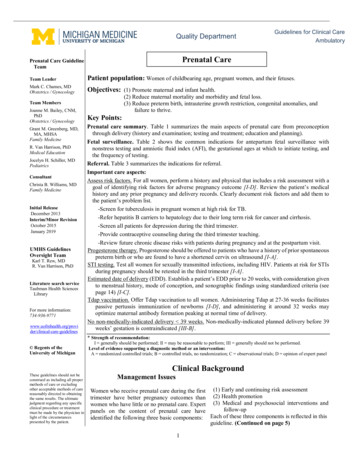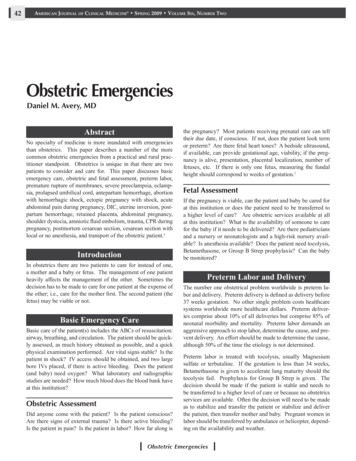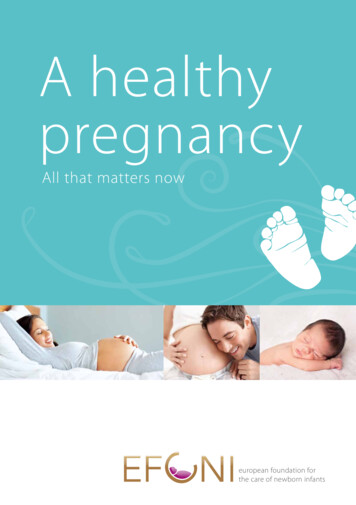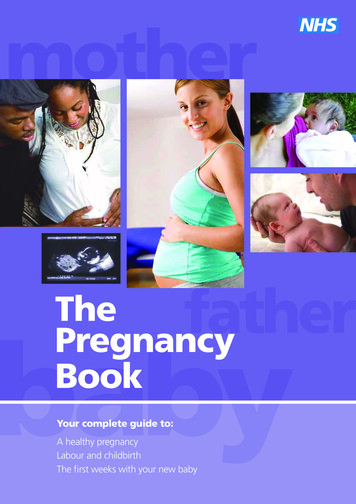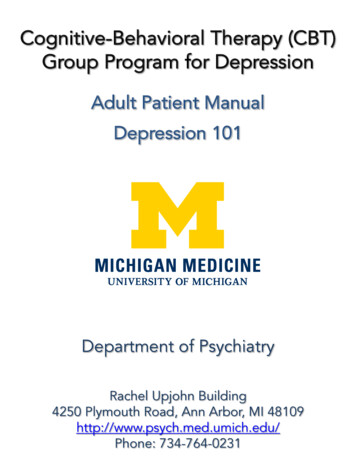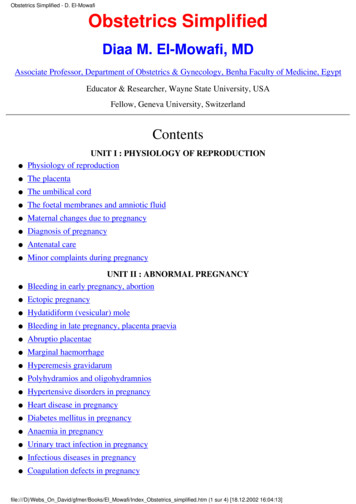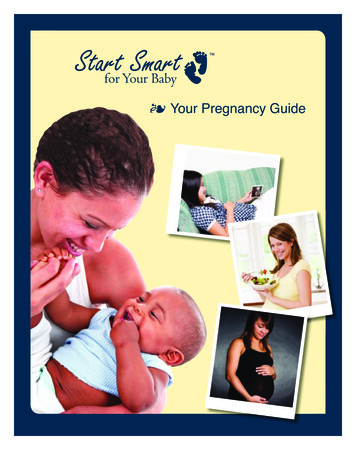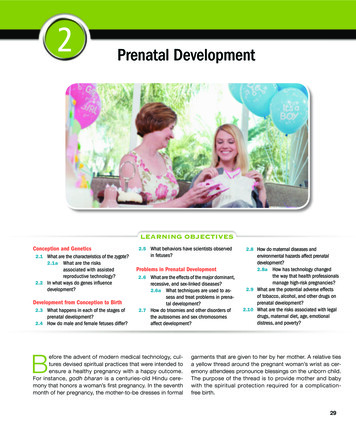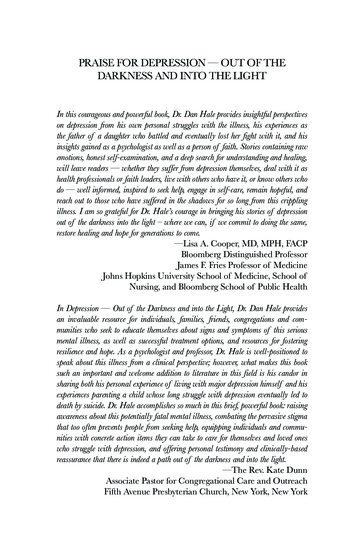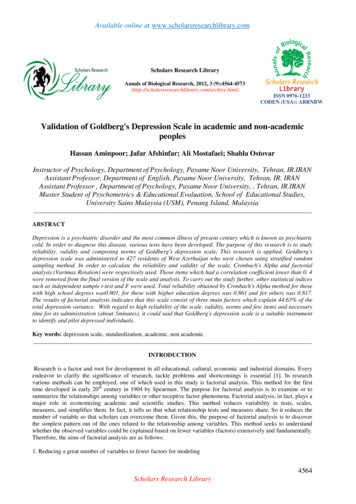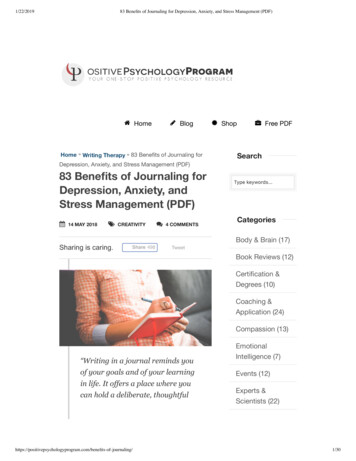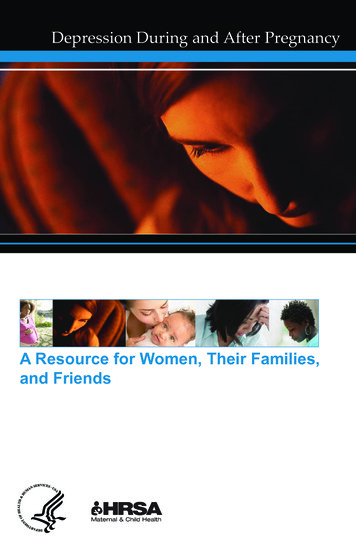
Transcription
Depression During and After PregnancyA Resource for Women, Their Families,and Friends
“I have trouble eating and sleeping.I feel lonely, sad, and don’t have theenergy to get things done. SometimesI don’t even want to hold my baby. Ifthis is supposed to be the happiest timeof my life, why does everything feel sowrong?”
Depression During and After PregnancyFor many mothers, the experience of pregnancy and childbirth isfollowed by sadness, fear, anxiety, and difficulty making decisions.Many women have difficulty finding the energy to care for themselves,their infants, and their families. Some even have feelings about harmingthemselves and their children.If this sounds like you or someone you know, there are two importantthings you should know.You are not alone.Help is near.A Resource for Women, Their Families, and Friends1
Did things change after you becamepregnant? Are things different thanyou expected as a new mother? Areyou tired, anxious, sad, and confused?This booklet will begin to explain thepossible causes for your feelings—andmore importantly— how to find thehelp you need.
Depression During and After PregnancyDepression during or after pregnancy refers to a broad range ofphysical and emotional struggles that many women face. You mayhave heard this called the “Baby Blues,” Postpartum Depression,Maternal Depression, Prenatal Depression, Postnatal Depression, orPerinatal Depression. In this booklet, we will call it PerinatalDepression.Perinatal Depression can be mild, moderate or severe. It can occurduring pregnancy or within a year after the end of your pregnancy.Without treatment, symptoms may last a few weeks, months, or evenyears. In rare cases, the symptoms are severe and indicate potentialdanger to the mother and baby. In all cases, help is available.A Resource for Women, Their Families, and Friends3
“Everybody expects me to be the perfectmother, but I just can’t do it. SometimesI feel like I can’t even care for my baby.”
Depression During and After PregnancyWhat Causes Perinatal Depression?There are a number of reasons why you may get depressed.woman, your body undergoes many changes during andpregnancy. You may experience mood swings (feeling up,down). A new baby will change your sleeping schedule andlifestyle. You may also feel pressures to be the perfect mother.As aafterthenyourPerinatal Depression can happen to some women who have familymembers with depression, or who have had depression in their ownpast. And for some women, the cause is unclear. But for every womanwho suffers Perinatal Depression, the causes are as unique as she is.Perinatal Depression – It’s More Than the Baby BluesMany new mothers experience the Baby Blues. This is a very commonreaction during the first few days after delivery. Symptoms includecrying, worrying, sadness, anxiety, mood swings, troubleconcentrating, difficulty sleeping, and not feeling yourself.The Baby Blues is not the same as Perinatal Depression and doesnot require medical attention.With time, patience, and thesupport of family and friends, symptoms linked with the Baby Blueswill usually disappear within a few days or within 1 to 2 weeks. Ifthey don’t, it may be a sign of a bigger problem, and you should seekmedical help.A Resource for Women, Their Families, and Friends5
“I was so excited I decorated thenursery months before the babyarrived. But when she came, it was nota dream. I had no energy to smile oreven to cry. I didn’t even want to pickher up. This was not how I thought itwas going to be, and I was ashamed ofhow I felt.”
Depression During and After PregnancyWho Is at Risk?Perinatal Depression can affect any woman—regardless of age, race,ethnicity, income, culture, or education. It affects women whobreastfeed and those who don’t. It affects women with healthy babiesand those whose children are ill. It affects first-time mothers andthose with more than one child. It affects women who are married andthose who are not. Women who had problems during pregnancy—and those who didn’t—may experience depression. Because PerinatalDepression is a health problem, it is not the fault of any woman.A family history of depression or bipolar disorder, a history of alcoholor substance misuse or abuse, a recent stressful event, relationship orfinancial problems, or a previous pregnancy with Perinatal Depressionincreases a woman’s chances of having Perinatal Depression.Types of Perinatal DepressionEven before the arrival of the baby, some women experience DepressionDuring Pregnancy. Pregnant women commonly face a large numberof challenges, including morning sickness, weight gain, and moodswings. Symptoms such as feeling really tired, appetite changes andpoor sleep are often dismissed as “just part of pregnancy,” but if thethings you do every day are affected, you should consider seekinghelp. Whether the pregnancy was planned or unexpected, the changesthat your body and emotions go through during pregnancy are veryreal—and so is the risk of Perinatal Depression during this time.A Resource for Women, Their Families, and Friends7
“I just wish that I could laugh andbe happy. When will my sadness goaway?”
Depression During and After PregnancyOne in seven women suffers a form of Perinatal Depression afterbirth known as Postpartum Depression. Symptoms can beginany time in the first year after giving birth.Common symptoms for Perinatal Depression (either during or afterpregnancy) include: Sad feelingsFeeling very anxious or worrying too muchBeing irritable or crankyTrouble sleeping (even when tired) or sleeping too muchTrouble concentrating or remembering thingsTrouble making decisionsLoss of interest in caring for yourself (for example, dressing,bathing, fixing hair)Loss of interest in food, or overeatingNot feeling up to doing everyday tasksFrequent crying, even about little thingsShowing too much (or not enough) concern for the babyLoss of pleasure or interest in things you used to enjoy(including sex)A very small number of women (one or two in 1000) suffer a rare andsevere form of Perinatal Depression called Postpartum Psychosis.Women who have a bipolar disorder or other psychiatric problem mayhave a higher risk for developing this form of Perinatal Depression.Symptoms of Postpartum Psychosis may include: Extreme confusionExcessive energy and agitationCannot sleep (even when exhausted)Rapid and extreme changes in moodDistrusting other peopleSeeing things or hearing voices that are not thereThoughts of hurting yourself, your baby, or othersIf you or someone you know fits this description, this is amedical emergency. Call 911 or go to the nearest emergencyroom.A Resource for Women, Their Families, and Friends9
Am I a Good Mother?“I was worried about what wouldhappen if people thought I couldn’t bea good mother. But when I got help,I realized that I was still the one incontrol.”
Depression During and After PregnancyHow Do I Know if I Have Perinatal Depression?Only a trained health care or mental health care provider can tell youwhether you have Perinatal Depression. However, the followingchecklist can help you know whether you have some of the commonsymptoms. Mark the box if the statement sounds familiar to you.During the past week or two –I have been unable to laugh and see the funny side of things.I have not looked forward to things I usually enjoy.I have blamed myself unnecessarily when things went wrong.I have been anxious or worried for no good reason.I have felt scared or panicky for no good reason.Things have been getting the best of me.I have been so unhappy that I have had difficulty sleeping.I have felt sad or miserable.I have been so unhappy that I have been crying.The thought of harming myself, my baby, or others has occurred to me.Did you check more than one box? If so, we encourage you to visitwith a trained health care or mental health care provider who can helpdetermine if you are suffering from Perinatal Depression and advise acourse of action.Checklist adapted from the Edinburgh Postnatal Depression Scale. Cox, J.L., Holden,J.M. & Sagovsky, R. (1987). “Detection of Postnatal Depression: Development of the 10item Edinburgh Postnatal Depression Scale.” British Journal of Psychiatry, 150,782-876.A Resource for Women, Their Families, and Friends11
“Some of the symptoms soundedjust like me. I knew it wasimportant to talk to my doctor.”
Depression During and After PregnancyIf I Have Perinatal Depression, What Can I Do?Some women may find it hard talking about Perinatal Depression.They may be unsure if they have it or how to discuss it. They may wishto deal with their problem secretly and hope that it goes away on itsown.These feelings are more common than one would expect. However,every woman must realize that she is not alone. Perinatal Depressionaffects thousands of women and can be treated successfully. It is possibleto feel better. Here are some things that can help.1.Talk to a Health Care ProviderScreening for Perinatal Depression should be a routine part of yourhealth care during and after pregnancy. Health care providers—suchas your doctor, your baby’s doctor, a nurse, or other health careprovider—are familiar with Perinatal Depression. They know ways tohelp, and can explain your options to you. An easy way to raise thesubject is to bring this booklet with you to the provider’s office. Showthe items that you checked and discuss them. Say that you werereading the booklet and some of it sounds familiar to you. If you feelthat your provider does not understand what you are going through,contact another provider. There are many excellent providers who dounderstand Perinatal Depression, who are ready to listen to you, andwho can put you on the road to recovery.2.Lean on Family and FriendsThere are many ways that family and friends can help you. A fewhours of weekly child care can give you a much-needed break. Get helpcleaning the house or running errands. When you share your feelingsopenly with friends and family, it allows them to provide the importantsupport that you need.A Resource for Women, Their Families, and Friends13
“Meeting with my support group is thebest part of the week. When I foundwomen going through the same thingsas me, I didn’t feel so lonely any more.Now we are moving forward together,hand in hand.”
Depression During and After Pregnancy3.Find a Support GroupAlthough you may not know it, there are probably other women in yourcommunity suffering from Perinatal Depression. Finding them can giveyou a chance to learn from others and to share your own feelings. Askyour health care provider how to find and join a support group.4.Talk to a Mental Health Care ProviderMany mental health care providers have special training to helpwomen with Perinatal Depression. They can give you a safe place toexpress your feelings and help you find the best ways to manage andeven get rid of your symptoms. When choosing counselors or otherprofessionals, ask if they have experience in treating PerinatalDepression. They have helped other women with depression and theycan help you too.5.Focus on WellnessAn important step toward treating Perinatal Depression is taking careof your body. A healthy diet combined with exercise can help you gainyour lost energy and feel strong. Consider these suggestions:Food Eat breakfast in the morning to start your day right Eat a variety of foods from all food groups, including two to fourservings of fruit and three to five servings of vegetables each day Choose healthy snacks like low fat milk, yogurt, fruit, and nuts Avoid alcohol useA Resource for Women, Their Families, and Friends15
“When my doctor suggested takingmedicine, I wasn’t sure. But it turnedout to be the best decision for me. I feelso much better now.”
Depression During and After PregnancyExercise Invite your friends to go on walks in your neighborhood orto the park Try a new activity, such as swimming or biking Take time to stretch and strengthen your musclesIn addition, try to focus on the most important things in your life andlet go of what is least important. This will help you clear your mind tofocus on your own health and well-being.6.Take Medicine as Recommended by YourHealth Care ProviderSometimes medicines are necessary in the treatment of PerinatalDepression. As with any medical treatment, you should talk toyour health care provider about which medicine, if any, may bebest for you during pregnancy or while breastfeeding. Become aneducated partner in your care.See page 21 for additional information.How Can Perinatal Depression AffectMy Baby and My Family?The symptoms of Perinatal Depression often create a very difficultsituation for families. For infants, the effects of Perinatal Depressioncan be serious. There is a greater chance of babies arriving too smallor too early, or having problems in learning and behavior as they growolder. Older children suffer when they lose the attention and supportof their mother. Loved ones suffer because they don’t know what to door how to help. Other family members are often called upon to fill thegap. Because Perinatal Depression affects the entire family, it is criticalthat family members recognize the symptoms and help their lovedone seek help.A Resource for Women, Their Families, and Friends17
“Something wasn’t right in our family.She felt so much sadness instead of joy.Together we decided to get help. Nowthat I understand what is happening,I can offer her more of the support sheneeds.”
Depression During and After PregnancyAdvice for Fathers, Partners, Family, and FriendsIf you know a woman who has the symptoms of Perinatal Depression,this is how you can help.As a Spouse or Partner: Encourage her to seek help. This is the quickest path torecovery. Offer support and encouragement. Your positive actions andwords can reduce some of her suffering. Listen. Her feelings are real. Let her express them to you. Allow her to focus on her own needs. Physical and socialactivities help women suffering from Perinatal Depression feelstronger, more relaxed, and better about themselves. Take time for yourself. A mother's depression can be hard onthe whole family. Fathers can suffer depression, too, before or afterthe baby is born.As a Friend or Family Member: Ask the mother how you can help, including babysitting andhouse cleaning. Let her know you are there for her, even if she doesn’t like talking. Understand that the father or partner may also feel stressed fromthe changes that come with being a new parent.Where Can I Get More Information?There are many excellent resources on Perinatal Depression. At yourlocal public library, you can use the Internet or check out books to getimportant information. There are telephone hotlines and supportservices where you can ask questions. Also, your health care providermay have additional resources. The more you understand aboutPerinatal Depression, the better you will be able to care for yourselfand the ones you love. A list of resources is located on page 21.A Resource for Women, Their Families, and Friends19
“I recognized the symptoms andtook charge. It was not easy, but withsupport from my family, friends, anddoctors, and drawing on my ownpersonal strength, I overcame PerinatalDepression and today I am movingforward. My family is well. My baby iswell. And most importantly, I am well.”
Depression During and After PregnancyResources for information and HelpFind Help NowCall 911 for emergency help now.If you are thinking about harming yourself or the baby, or if you are concerned about someone, call now.Or get someone you trust to help you make the call.National Suicide Prevention Lifeline1-800-273-TALK (8255) TTY: 1-800-799-4889 Visit the National Suicide Prevention Lifeline websiteTalk to a trained, confidential crisis counselor 24 hours a day, 7 days a week –for ANY mental health or substance use concern.Substance Abuse and Mental Health Services Administration's National Helpline1-800-662-HELP (4357) TTY: 1-800-487-4889Call the National Helpline for free, confidential, 24/7 information and referrals to local mental health andsubstance use disorder treatment facilities, support groups, and community-based organizations.Find Local ResourcesPostpartum Support International (PSI)1-800-944-4PPD (4773) for answers to questions and information on resources in your area.Text: 503-894-9453 Visit the PSI websiteRaises awareness of the public, families and professionals about the emotional changes that womenexperience during pregnancy and postpartum. Has resources for both mothers and fathers.NAMI, the National Alliance on Mental IllnessNAMI Helpline 1-800-950-NAMI (6264) Visit the NAMI websiteThe nation’s largest grassroots mental health organization dedicated to building better lives for themillions of Americans affected by mental illness.SAMHSA's Behavioral Health Treatment Services LocatorVisit the Behavioral Health Treatment Services Locator websiteA confidential and anonymous source of information for persons seeking treatment facilities in the U.S.or U.S. Territories for substance use and/or mental health problems.Additional ResourcesMotherToBaby: Medications & More During Pregnancy & Breastfeeding, Ask the ExpertsCall 866-626-6847 or Text 855-999-3525 Visit the MotherToBaby websiteMoms’ Mental Health MattersVisit the Moms’ Mental Health Matters websiteAmerican College of Obstetricians and Gynecologists (ACOG)Visit ACOG's websiteResources for you and your health care providerA Resource for Women, Their Families, and Friends21
Depression During and After PregnancyA Resource for Women, Their Family, and FriendsThe information in this booklet is not a substitute for personal medical advice,attention, diagnosis or treatment. If you have questions or concerns aboutyour health or the health of your baby, consult your health care provider.U.S. Department of Health and Human ServicesHealth Resources & Services Administration5600 Fishers LaneRockville, MD 208572019This booklet is available from HRSA's Maternal and Child Health Bureau
during pregnancy or within a year after the end of your pregnancy. Without treatment, symptoms may last a few weeks, months, or even years. In rare cases, the symptoms are severe and indicate potential danger to the mother and baby. In all cases, help is availab
